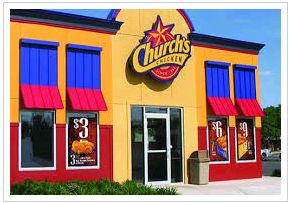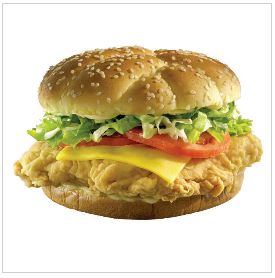
I read an article about a trademark/copyright lawsuit in Puerto Rico over the "Pechu Sandwich" which is a sandwich sold by Church's Chicken on the island. There is another interesting article about it in the Washington Post. The authors of both posts setout thevery humorous set of circumstances in which an ex-employee sues the restaurant chain (technically, the franchisee) over a sandwich he allegedly came up with more than 20 years ago while he was an employee of the restaurant working as a store manager.The idea was using fried chicken on a sandwich, which became the Pechu Sandwich.

The Church's Chicken franchisee (local restaurant operator) began selling the sandwich in Puerto Rico in 1991. The franchisor (former Church's brand owner AFC Enterprises) filed a trademark registration on the trademark PECHU SANDWICH in Puerto Rico that was issued in 1999. The trademark and its goodwill was transferred back to the local restaurant operator ("SARCO") in 2005, and soon after SARCO applied for and received a U.S. registration for the same mark from the U.S. Patent and Trademark Office. The district court found that Church's had sold more than $369,000,000 in revenue from the Pechu Sandwich. That is a lot of fried chicken.
In 2013, the same employee (Mr. Colon) sues SARCO for both trademark infringement and copyright infringement. The analysis for the two claims have been sort of glommed together though, but make a useful juxtaposition.
Trademark Claim
A trademark can only arise through selling something in commerce. Trademarks cannot exist on their own, and only exist to designate the products or services to which they are attached. It is irrelevant, for trademark purposes, who came up with a trademark. The question is who first used the mark to designate products and whether that person continues to sell products under the mark. The District Court opinion states that Mr. Colon never sold sandwiches under the name PECHU SANDWICH other than as an employee at the Church's Chicken restaurant. Mr. Colon lost on his trademark claim because he never had any trademark rights in the mark. He also lost his claim for fraudulent procurement of a trademark registration for similar reasons.
Copyright Claim
Mr. Colon didn't call his other claims copyright claims, but
he spoke about them in copyright terms. This is part of what
created the confusion. He essentially claimed that his concept for
the fried chicken sandwich was a work entitled to copyright
protection.
17 U.S.C. Section 102 states:
(a) Copyright protection subsists, in accordance with this title, in original works of authorship fixed in any tangible medium of expression, now known or later developed, from which they can be perceived, reproduced, or otherwise communicated, either directly or with the aid of a machine or device. Works of authorship include the following categories:
- literary works;
- musical works, including any accompanying words;
- dramatic works, including any accompanying music;
- pantomimes and choreographic works;
- pictorial, graphic, and sculptural works;
- motion pictures and other audiovisual works;
- sound recordings; and
- architectural works.
(b) In no case does copyright protection for an original work of authorship extend to any idea, procedure, process, system, method of operation, concept, principle, or discovery, regardless of the form in which it is described, explained, illustrated, or embodied in such work.
Mr. Colon'sclaims are essentially that (i) the idea of the sandwich was his; (ii) the sandwich was his copyrightable creation, (iii)he owned the copyright in the sandwich recipe, and (iv)he owned the copyright in the name PECHU SANDWICH.
He lost his copyright claimsbecause: (i) Section 102(b) above makes it clear that there is no copyright protection in the idea for something; (ii) the sandwich itself is not entitled to copyright protection because it does not fit one of the categories in Section 102(a) – not even as a sculptural work; (iii) the bare list of ingredients for the sandwich is not entitled to copyright protection – cookbooks are entitled to copyright protection because of the descriptions, illustrations, and other creative aspects found in them; not because of ingredient lists; and, finally, (iv) there is no copyright protection in short titles and phrases.
Bonus round: Even if copyright had existed for any of those items, it seems pretty likely that it would have been created and developed within the scope of Mr. Colon's employment as a store manager. It is also very likely that the franchise agreement between SARCO and AFC Enterprises at the time would have assigned those rights up to AFC. So, he'd have lost anyway.
The district court opinion is here and the First Circuit Court of Appeals opinion is here.
Good luck out there.
The lawyers at Trademarkology provide trademark registration services backed by the experience and service of one of the nation's oldest law firms. Click here to begin the process of protecting your brand name with a federally registered trademark.
The content of this article is intended to provide a general guide to the subject matter. Specialist advice should be sought about your specific circumstances.
